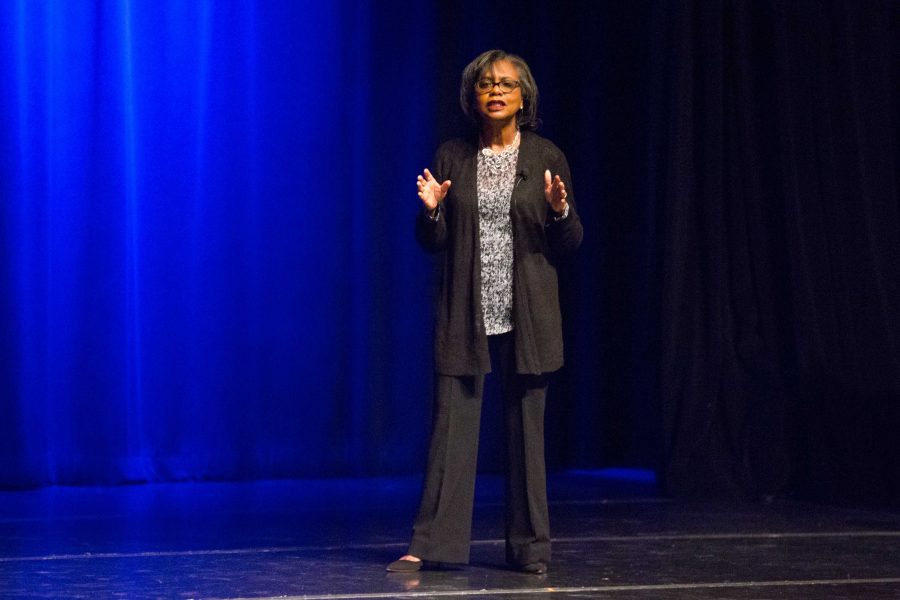Anita Hill delivered her lecture, entitled “No Longer Silent: Underrepresented Narratives in Sexual Violence” on Oct. 28 in Langford Auditorium. She spoke of her belief in sexual assault victims having the ability to tell their full stories.
“When we are not allowed to tell in our words what’s happening, when we have to go through an interrogator, we are missing the full story,” Hill said. “And when we fail to capture the full story, we miss the chance to make lasting change.”
Hill has experience with being prevented from telling her story. In 1991, she accused her former boss, Clarence Thomas, of sexual harassment as he was being confirmed to the Supreme Court. Over the course of the hearing, the Senate Judiciary Committee questioned Hill’s credibility and blocked multiple witnesses from testifying on her behalf, ultimately confirming Justice Thomas to the court.
Despite losing her case and facing harsh backlash from conservatives, Hill said that the hearing only affirmed her commitment to standing up for her beliefs.
“Six months after the hearing I made a promise that I would do whatever I could to affect change, and that I would continue to use my voice in defiance of the naysayers and the people who wanted me to just go away and never be seen again,” Hill said. “I would remain active, and present, and vocal.”
Hill, who now teaches law at Brandeis University, addressed a packed crowd in Langford Auditorium. She spoke as part of the Vanderbilt Student Government Sexual Assault and Prevention Committees second annual conference on sexual assault. Hill was greeted with a standing ovation when she walked onstage, and many of her statements were punctuated by the audience’s applause.
Her remarks at Vanderbilt come shortly after Justice Brett Kavanaugh was confirmed to the Supreme Court amid allegations that he had sexually assaulted Dr. Christine Blasey-Ford when they were in high school. The Kavanaugh hearing had striking similarities to Justice Thomas’ confirmation hearing.
“We are at a critical moment,” Hill said. “The Kavanaugh hearing was not just about whether or not Judge Kavanaugh would become Justice Kavanaugh. The Kavanaugh hearing can be a referendum on how we are going to move forward as a country. Are we going to give complete investigations? Are we going to hear the voices of the underrepresented?”
She used the phrase “rationing of justice” to refer to how cases of sexual assault and harassment have been handled in the past.
“The question that I have today is are we going to protect everyone, or are we going to ration justice? Either justice is whole, or it doesn’t exist. There is no such thing as a just rule where people are left out.”
Toward the end of her forty-five minute remarks, Hill expressed hope for the future.
“We are starting to hear the stories of people who have been underrepresented in our public discussion,” she said. “And it is only when we hear those stories and pay attention to them can we make sure that our policies are going to be effective.”
Hill closed her remarks by encouraging the audience members to do more.
“What we need is people like you, people like our leaders in our institutions, be those places of worship, school or work, we need you to say that even when our government is not protecting women from sexual violence, we will stand with them,” Hill said. “We need for everyone to make that statement. You cannot be a bystander.”
Hill took questions from the crowd for about twenty-five minutes following her lecture. She responded to subjects ranging from how we can ensure that campus sexual assault proceedings are handled fairly, how she practices self-care, and whether she would endorse Joe Biden, who headed the Senate Judiciary Committee during her case, as President (the answer was no).
Audience members felt that they learned a lot from Hill’s remarks.
“I was really unaware that the first victims of sexual assault who spoke out were all African American,” said freshman Jessica Kaplan, referring to the women who brought sexual assault cases in the 1970s and 1980s that Hill said gave her a precedent for coming forward with her own allegations.
“I thought it was really interesting to hear an individual perspective about [the 1991 hearings] because usually what you hear is from the media, instead of the actual accounts and stories of the people who were involved,” said freshman Collin Lawrence. “I think no matter what side you’re on it’s important to listen and take into account what each person has to say.”



